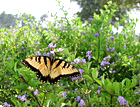Fertilizer & Pesticide Use
Fertilizer Use
To grow properly, plants need nutrients (nitrogen, potassium, calcium, zinc, magnesium, iron, manganese, etc.) which normally can be found in the soil. Sometimes fertilizers are needed to achieve a desired plant growth, but they are not always used properly. Below are a few tips:
Apply compost
When added to the soil, compost creates a balanced medium for sustained plant health.
Apply a specific mineral
Talk to your local home garden center specialist for the right one.
Apply a packaged fertilizer
Choose a fertilizer that contains slow-release nitrogen and other nutrients. This is the most environmentally safe and cost-effective method and requires fewer applications. Look for a fertilizer with at least 30% slow-release nitrogen; you can figure this out by looking at the percent of water insolable nitrogen, which indicates the percent of slow-release nitrogen (see Figuring Out Fertilizer). Plus, for most applications, only 0 - 2% phosphorus is needed.
Reading a fertilizer label
- For example, 10-2-10 means 10% of the bag is Nitrogen, 2% is phosphorus, and 10% is Potassium.
- Read labels closely to see if other nutrients are included.
- As a general rule, the first and third number should be the same.
- The middle number should be no more than half the total value of the other included nutrients.
Try to reduce the use of fertilizers—when over-applied, fertilizers can increase insect and disease problems. Rapidly growing plants are weak and without an adequate root system. The excess also increases run-off from yards and can contaminate waterways.
Pesticide Use
The use of pesticides has become the most common approach to pest control. This has resulted in pest resistance to a pesticide, and the destruction of beneficial organisms.
Pesticides and other chemicals are often seen as essential tools to maintaining a beautiful yard. However, pesticides used in urban landscaping contain chemicals, such as diazinon (PDF) and chlorpyifos (PDF), which can migrate through the ground and be toxic to a number or organisms including fish and invertebrates. Most pesticides do kill their target pests but they also kill beneficial organisms living in the soil, such as pollinators and pest predators, and pose health risks to wildlife. Using pesticides also reduces insect populations that are an important food source for birds and other wildlife.
The best way to minimize the migration of these toxic chemicals into our natural environment is to reduce or eliminate the use of them.
Non-toxic alternatives to pesticides
The Air and Waste Management Association has developed this list to help you reduce or eliminate pesticide use around your home.

